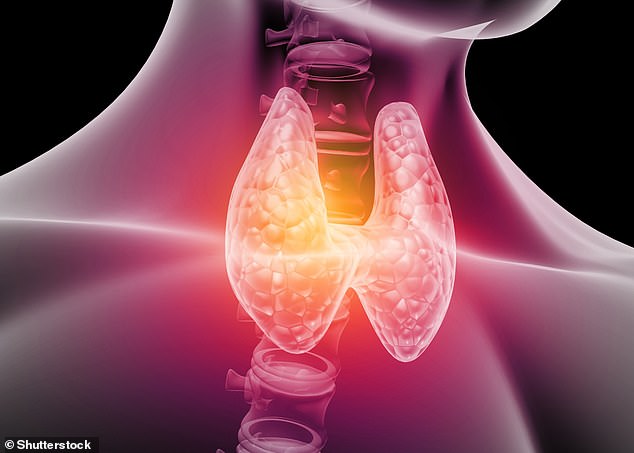[ad_1]
Top diet experts say a Mediterranean-style diet can help ease the mystery weight gain, crushing fatigue and palpitations suffered by women with thyroid disease – which affects one in 20 in the UK.
The problems arise when the thyroid, a butterfly-shaped gland in the neck, malfunctions.
An underactive thyroid – also known as hypothyroidism – leaves sufferers exhausted, piling on weight, constipated and constantly cold.
An overactive thyroid – hyperthyroidism – causes the opposite: dramatic weight loss, sweats, itching and palpitations.
Both conditions are on the rise and require medication, however doctors say diet can make a difference.
Hannah Belsham, physiologist at the Nuffield Trust, recommends a Mediterranean-style approach. ‘Plenty of fruit, vegetables, wholegrains, lean proteins and healthy fats are key,’ she says.
‘Nutrients such as selenium, zinc, iodine, iron, calcium and vitamin D are particularly important.’ These are found in nuts, seeds, oily fish and lean meats.
Pharmacist and nutritionist Deborah Grayson warns those with an overactive thyroid should watch their intake of iodine.

We asked experts if you can actually manage symptoms of thyroid problems with diet changes
‘Dairy contains significant amounts, which can help feed hyperthyroidism. Cutting back could be beneficial,’ she says.
GP Dr Nirusha Kumaran agrees that diet matters. She advises avoiding ultra-processed foods (UPFs) such as sweets, chocolate and cakes, as well as excess caffeine.
‘These are inflammatory and can worsen thyroid symptoms,’ she explains. ‘Better choices are lean proteins, complex carbohydrates, fruit, vegetables and omega-3 rich foods like oily fish.’
Her comments echo research. A 2022 study showed heavy consumption of ultra-processed foods raises the risk of thyroid problems.
Other studies link UPFs to obesity, heart disease, type 2 diabetes, cancer and early death.
NHS GP Dr Asia Ahmed, who also works with the health-testing firm Medichecks, adds that alcohol can worsen the condition. ‘Diet plays a significant role in overall health – whether you have a thyroid condition or not,’ she says.

Ms Grayson, a pharmacist and nutritionist
‘Research is ongoing to understand the exact impact of food and nutrients on thyroid health, but there is evidence certain nutrients affect thyroid function.’
However, she stresses diet is no cure. ‘There are several foods and supplements which may interfere with thyroid drugs,’ she warns.
Calcium and iron supplements, coffee, walnuts, high-fibre diets and calcium-fortified juices can all affect absorption.
Patients are told to take medication on an empty stomach and to wait at least half an hour before eating.
Despite this, social media is brimming with so-called thyroid ‘cures’.
On TikTok, women swap stories of cutting out gluten or dairy, claiming it transformed their energy levels or helped them lose weight.
Others demonstrate ‘thyroid-friendly’ snacks. One viral recipe – mashed mackerel with avocado wrapped in seaweed, dubbed the ‘mackerel roll-up’ – may look bizarre, but experts say it does provide nutrients that support the gland.
Thyroid disease is far more common in women than men – ten times more likely – though the reason remains unclear.
In many cases it is triggered by the immune system going awry. In Hashimoto’s disease, the body destroys thyroid tissue, causing underactivity.
Previously model Gigi Hadid revealed she has Hashimoto’s disease which meant she had to eat healthy and work out which led her to lose her curves.
In Grave’s disease, the immune system pushes the gland to churn out excess hormones.
American rapper Miss Elliot has previously shared she suffers from Grave’s disease, so bad it left her unable to write with a pen.
Meanwhile Good Morning Britain presenter Kate Garraway shared she suffered from an overactive thyroid which has since become underactive.
The wide range of symptoms means women often go undiagnosed for years.
Some only discover the cause of their problems when they see a hairdresser, who notices their hair is thinning or falling out.
Others are investigated after months of unexplained tiredness, weight gain or mood changes.
Although far rarer, thyroid problems can also be linked to cancer. Around 3,900 people in the UK are diagnosed with thyroid cancer every year.
It is usually treatable if caught early, but experts say most women experiencing weight changes or fatigue are far more likely to have hypo- or hyperthyroidism than cancer.
Doctors hope the growing interest in diet will at least raise awareness. ‘Food alone won’t fix a broken thyroid,’ says Dr Kumaran. ‘But good nutrition can make living with one far easier.’
The fresh advice follows a major study published last month which found that a Mediterranean diet can slash the risk of diabetes by a third.
Researchers in Spain and the US tracked almost 5,000 obese adults for three years and found it was most effective when combined with exercise, calorie restriction and weight-loss support.
[ad_2]
This article was originally published by a www.dailymail.co.uk . Read the Original article here. .

